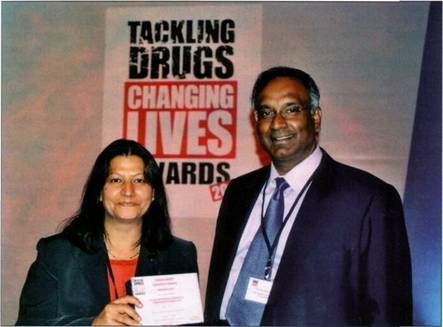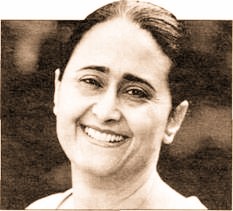Commendations

Challenging The Fast-Fix Culture
Perminder Dhillon is awarded the Drug Worker for London at the Home Office's Tackling Drugs, Changing Lives Awards 2006. She is also short-listed for the Asian Women Achievement Award on the 23 May.
For a young person from a migrant community, getting help with a substance misuse problem can be a challenging ordeal, complicated by cultural and language barriers. DDN talks to Perminder Dhillon of the Drug and Alcohol Action Programme (DAAP) about making the process easier.
Migrant young people will certainly do what ever young people here are doing - including experimenting with drugs,' says Perminder Dhillon, chief executive officer for DAAP. 'That is why we work with the community that they relate to the most, so that they feel empowered and educated about addiction and related issues.'
Commissioned by the Ealing Primary Care Trust and local DAT, DAAP was set up in 2002 with the main aim of bringing together diverse communities to educate them on substance misuse in different local languages.
According to the Office for National Statistics, 2006 saw more than 314,000 migrant young people attend secondary school in the UK. One of the ways in which DAAP has been successful in accessing some of these young people is through their Ealing Drug Education Project (EDEP).
Part of the EDEP scheme looks at working with pupils who may have been excluded from schools or colleges for substance misuse. 'It's direct intervention,'says Dhillon. 'This means working within a small group where we'll get the young person to look at their offending behaviour and why they were suspended'. This can mean delving into their personal lives and issues surrounding them - their family, personal identity, self-esteem and any instances where they have been involved in crime.
DAAP's officers and volunteers provide drug and alcohol sessions in Gurmukhi Punjabi, Mirpuri Punjabi, Urdu, Bengali, Gujrati, Somali and Farsi as well as English. Literature and resources are also translated, such as a video intended for the African-Caribbean community, which tackles black-on-black crime as well as crack use by featuring the Black Police Association, the London mayor's race equality advisor, and poet Benjamin Zephaniah.
'We try and use positive role models and household names that people will recognise and identify with,'says Dhillon.
'You will find Benjamin Zephaniah admitting to drug experimenting, but saying that he gets high on his music. Some young people watching the video might think, "if he comes from the 'ghetto of Handsworth' and he's now a Cambridge chair [of poetry], then maybe there's a possibility for someone like me'", she says.
With a growing Somali community in Ealing, DAAP is increasingly coming into contact with problems related to khat, the stimulant plant whose leaves (when chewed) have been linked to psychosis. In some cases, fathers are spending child benefit on khat. In others, families complain that fathers are often absent because they are at khat chewing housing known as merfrishes. 'Rather than having a chew for an hour, the men might sit there longer if they're unemployed or have other problems,'says Dhillon. 'What kind of role model does a young man growing up in such a family have?'
According to Dhillon, it is usually a member of the family that approaches the organisation to ask for information on someone else's behalf. 'It is not uncommon for a parent to come to us and say, "my child is using drugs" or "could you please ring our son for us?" in which case we do, providing we get the permission from him first.'
Other referrals come from youth offending teams, with the aim of diverting their young clients from a life of crime. As part of a one-day workshop, DAAP takes them to Coldingley Prison in Berkshire, where they get to see what life is like behind bars. A response tends to be: 'Oh my God, is that where I will end up? Can I get further help on what I've been using so I don't end up here?' says Dhillon - DAAP's cue to refer them onto specific rehabs, counsellors or detox centres.
Keeping young people engaged once the work has started is among the service's biggest challenges. 'It's not just a question of peer pressure,' says Dhillon. 'Young people can't wait to be adults; they socialise around pubs and clubs. How many young people have got enough money to go to a restaurant and have a sit-down meal for example? The whole of society is geared towards fast living, fast food, fast fixes... a lot of young people are caught up in that no matter how much work organisations like us do.'
With many of DAAP's young people coming from families with a low income or unemployment, extracurricular and self-development can come way down the list - a gap that the service tries hard to fill.
'A lot of drug agencies are so busy with providing a service that they don't have the capacity to deal with wider issues. I think we're quite fortunate as we can work on different areas,' says Dhillon. 'The crime diversion scheme is not just about taking them to the prison, it's working with them before and after and giving them the opportunity to get involved in different initiatives.' DDN
Article about empowering communities in Vishvas Health Project newsletter... Read more
Communinity Champion

COMPASSION, love and dedication to helping others is just some of the praise heaped on a mother-of-four nominated as Community Champion.
Harbhajan Ghatore, of Eldon Road, has been tireless in her work with the Drug and Alcohol Action Programme in Southall, highlighting the problem and helping the victims beat addiction.
A long-time campaigner, she helped start the Southall Black Sisters movement in the 70s and joined demonstrations over the death of Blair Peach. But after a break to raise her children, a love of Southall and the spiralling drug problem forced the 42-year-old to return to the fray.
Now, running a women's support group for victims of domestic violence and training volunteers are just some of the many strings to her bow. The project worker said: "I was taken aback when I was told. I'm not the sort of person who likes the limelight, but I'm honoured. I've lived in Southall since I was 10, I was involved in a lot of community activities, I had 18 years off and to bring up my children but Southall pulled me back in".
"I've seen the changes and drugs have taken over and wanted to do something about it. I got involved five years ago and got a job three and half years ago".
(Copyright © Southall Gazette: published 20/4/2007)